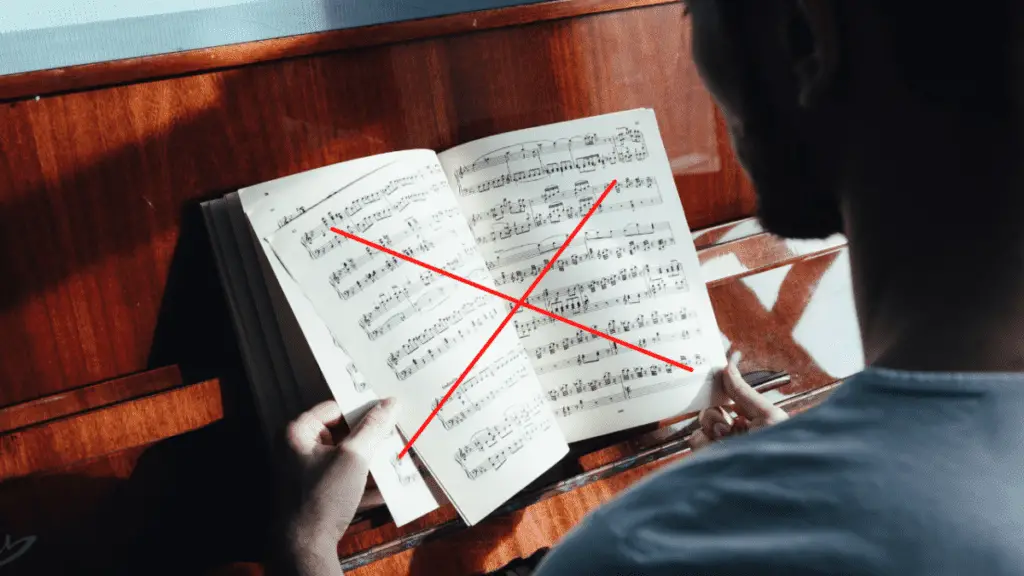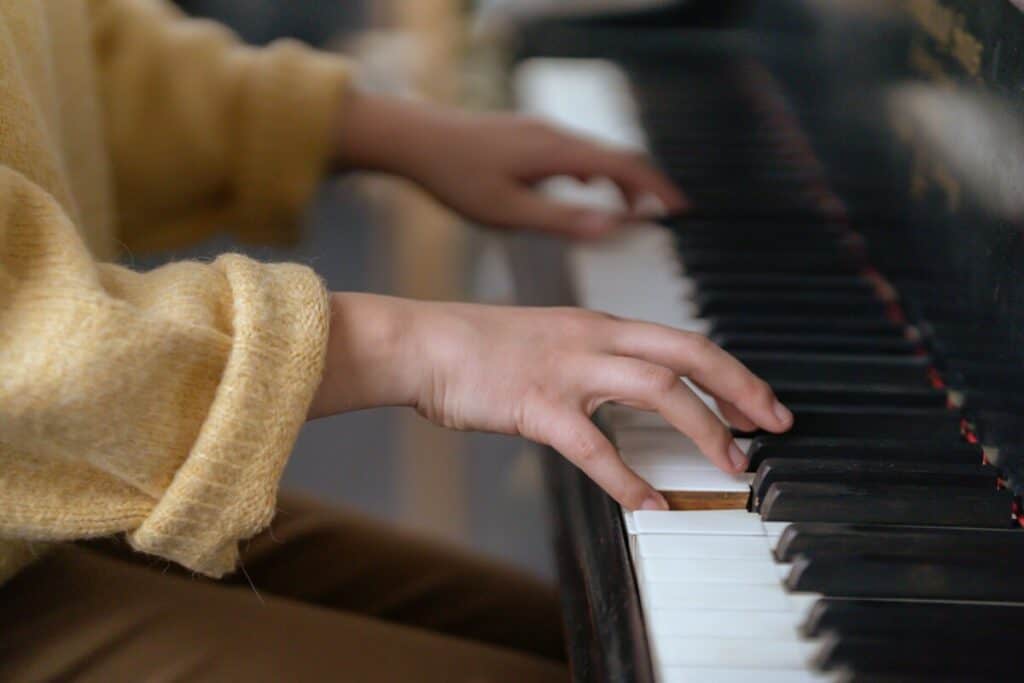This post contains affiliate links.

As a pianist, the ability to be able to play by ear any songs you heard is very enticing and interesting. However, is playing by ear a talent exclusive to a few and is it even a necessary skill to have for classical pianists especially?
Playing by ear is possible for beginner-level classical piano pieces, pieces above beginner-level are often too complex to play without piano sheets. As a pianist, playing by ear is a skill that should be used in addition to mainly reading from sheets to play classical piano.
This article will explain what playing by ear is for those that don’t know, why everyone can learn how to do it, explain why as a classical pianist, playing by ear should be an additional skill to have, while also listing some benefits if you do decide to learn it.
I’ll also give some tips on how to learn to play by ear and give you a few examples of famous classical pianists that can play by ear.
Can you learn how to play by ear?
Playing by ear is the ability to reproduce a piece or a song just by listening to recordings of it on the piano, without looking at the sheets for that piece/song.
While some people are blessed with a perfect pitch that makes this ability seems easy and second-nature to them, this talent is rare and for the rest of us, playing by ear is just another skill that can be learned can be perfected.
We all have the ability to play by ear. It’s important to note that if you can remember tunes, then you are playing by ear in a way.
The black and white dots, the different squiggles on a piece of paper are really just a recording of music. The sheet itself isn’t music, but music is the sound you’re creating. It’s similar to how writing is just a recording of everyday speech.
Is playing by ear necessary for classical pianists?
Ear training and being able to play by ear are skills that aren’t emphasized as much or as common in classical piano compared to other genres of piano because most songs are taught and played by using sheets in classical piano.
Classical pianists are expected to play note for note, exactly how the piece was written. If there’s isn’t a music sheet in front of the pianist, then the pianist is expected to have completely memorized the whole piece in their head, leaving little need for being able to play by ear.
However, in another piano genre like jazz, playing by ear is a critical skill to have since jazz is all about improvisation. Piano sheets only serve as a guideline for chord changes and melodies, it’s up to the pianist themselves to apply music theory and personal preferences to come up with their own covers of the piece.
Furthermore, most classical pieces above beginner-level are very complex and you’ll have a hard time playing them accurately without music sheets.
With that said, there are several benefits to knowing how to play by ear for classical pianists if you do choose to do so.

Benefits to playing classical pieces by ear
Identify and memorize common chords or notes within a scale
Playing by ear will help you pick up the sounds of some common chords seen in piano pieces along with notes within different scales. By doing this you’ll memorize those chords and notes better than simply seeing them on piano sheets and committing them to memory.
Help with memory slips while playing classical piano
If you’ve ever played in front of the crowd or even recorded yourself practicing playing, you’ll know that the nervousness that occupies your mind can cause you to temporarily zone out for 1-2 seconds. However, those short 1-2 seconds are enough to cause memory slips – where you forget which notes you are supposed to hit next.
At this point, you’ll start having a mini panic and hit the wrong notes. If you’re recording yourself, then you’ll have to annoyingly start recording the whole piece again from the beginning, while accidentally slipping up while playing in a recital or in front of any crowd can frustrate or embarrass you.
By learning how to play by ear and be able to identify common chords and notes, when the memory slip happens, you can imagine what the melody sounds like in your head at that moment and play the correct notes accordingly even without piano sheets in front of you.
This is why knowing how to play by ear can be a useful tool to have in case of memory slips while playing complicated classical pieces.
Going to music college
If you plan to go to a music college to further advance your music skills and knowledge, many music colleges have ear training as part of their curriculums, where a teacher/professor will play a melody on the piano and you’ll have to identify and write down the notes/chords.
Thus, it’s better to learn how to play by ear now in preparations to make your studying at the college a bit less hectic.

Tips on learning how to play by ear
Work at developing your listening
Working on exercises that help develop relative pitches to make it easier to start playing songs that you hear. Here are 2 exercises you can try out to help develop your listening:
| Exercise 1 | Exercise 2 |
| 1. Choose a song with a strong melody (rock or folk) or easy like nursery rhymes 2. Listen to it several times and hum along 3. Then try to match the notes playing on your piano through trial and error | 1. Ask a friend or family member to play two notes on the piano 2. Identify which note is the higher one 3. Start out easy with notes that are far apart, then increase the difficulty by having them play closer and closer notes. |
By doing these 2 exercises, again and again, you will get better and better at guessing the correct notes to play by just hearing the songs, without looking at the sheets.
Learning music theory
By learning music theory like chords progression, you’ll be able to identify them when either looking at the piano sheets or when listening to a new song, making it easier to play on the piano.
Famous classical pianists that can play by ear
Any professionally trained classical pianist knows how to play by ear since it’s a handy skill to have and it’s part of the college’s curriculum.
Many famous classical pianists can play by ear. For example, Josef Hofmann, often regarded as a genius, can play complex pieces 3-4 minutes long after hearing them only once or twice. There are accounts of him playing a piece as an encore in a concert after hearing it played by someone else earlier in the day.

